
The Ebenezer Methodist Episcopal Chapel and Cemetery is a historic church located northwest of Golden, Adams County, Illinois. The church was built in 1858–59 for the local Methodist Episcopal congregation.
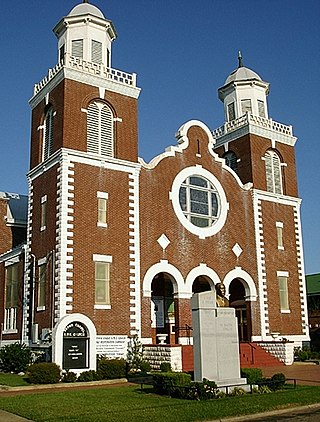
Brown Chapel A.M.E. Church is a church at 410 Martin Luther King Jr. Boulevard in Selma, Alabama, United States. This church was a starting point for the Selma to Montgomery marches in 1965 and, as the meeting place and offices of the Southern Christian Leadership Conference (SCLC) during the Selma Movement, played a major role in the events that led to the adoption of the Voting Rights Act of 1965. The nation's reaction to Selma's "Bloody Sunday" march is widely credited with making the passage of the Voting Rights Act politically viable in the United States Congress.

The Methodist Episcopal Church is a historic church and parsonage at 61 East Putnam Avenue in Greenwich, Connecticut. Built in 1868-69 for a Methodist congregation established in 1805, the church is a fine local example of Carpenter Gothic architecture, and the parsonage, built in 1872, is a good example of Italianate architecture. The property was listed on the National Register of Historic Places in 1988. The congregation is affiliated with the United Methodist Church.

The Metropolitan African Methodist Episcopal Zion Church is a historic Methodist Episcopal Church at 2051 Main Street in Hartford, Connecticut. This High Victorian Gothic structure was built in 1873-74 for an Episcopal congregation, and has since 1926 been the home to the city's oldest African-American congregation, which was established in 1833. The church was listed on the National Register of Historic Places in 1994.

Mount Zion African Methodist Episcopal Church and Mount Zion Cemetery is a historic church and cemetery located at 172 Garwin Road in Woolwich Township, New Jersey, United States. The church was a stop on the Greenwich Line of the Underground Railroad through South Jersey operated by Harriet Tubman for 10 years. The church provided supplies and shelter to runaway slaves on their way to Canada from the South. The church and cemetery were part of the early 19th-century free negro settlement sponsored by Quakers known as Small Gloucester.
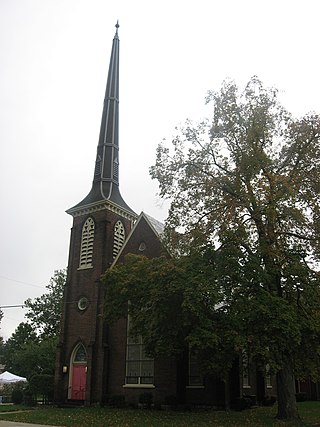
Bethel African Methodist Episcopal Church of Monongahela City is a historic church at the junction of 7th and Main Streets in Monongahela City, Pennsylvania.

The Mechanicsburg Baptist Church is a historic church in the village of Mechanicsburg, Ohio, United States. Constructed for a Methodist congregation in the late nineteenth century, the building was taken over by Baptists after the original occupants vacated it, and it has been named a historic site.

The St. James AME Church in Ashland, Kentucky is a historic African Methodist Episcopal church at 12th St. and Carter Avenue. It was built in 1912 and added to the National Register of Historic Places in 1979.

Lomax African Methodist Episcopal Zion Church is an historic African Methodist Episcopal Zion church located at 2704 24th Rd. South in Arlington, Virginia. It was built in 1922, and is a one-story, three bay by six bay, brick church building on a parged concrete foundation. It features two unequal-sized crenellated towers and brick buttresses along the facade and side elevations in the Late Gothic Revival style. Also on the property are two contributing resources, including a cemetery dating from circa 1894, and a parsonage built in 1951. The cemetery contains approximately 107 interments.

Bethel African Methodist Episcopal Church is a historic African Methodist Episcopal church located at 369 Drayton Street in McClellanville, South Carolina. It was built around 1872, and is a one-story, rectangular frame vernacular Gothic Revival church. It has a pedimented gable-front roof that supports a square-based steeple. A cemetery is on the property. It was added to the National Register of Historic Places in 2004.
Old Ebenezer Church, also known as Ebenezer Methodist Episcopal Church, South, is a historic church located near Latta, Marion County, South Carolina. It was built in 1856, and is a one-story, rectangular meeting house style frame church sheathed in white clapboard. It has two entrances on the main façade, corresponding doors on the rear façade, and a gable roof.

Tindley Temple United Methodist Church, also known as Tindley Temple Methodist Episcopal Church and Calvary United Methodist Church, is a historic Methodist Episcopal church located in the Southwest Center City neighborhood of Philadelphia, Pennsylvania. It was built between 1923 and 1928, and is a large masonry building influenced by the Beaux-Arts Romanesque and Art Deco styles.
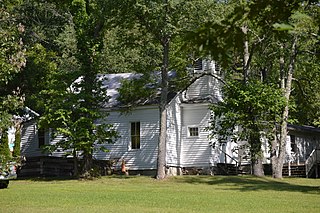
John Wesley Methodist Episcopal Church and Cemetery, also known as John Wesley United Methodist Church and Wesley Chapel, is a historic Methodist Episcopal church and cemetery located at West Warm Springs, Bath County, Virginia. It was built by former slaves in 1873, and is a one-story, front-gabled, log church, clad in weatherboard with a stone foundation. A frame vestibule with bell tower was added to the front of the church and a choir loft rear extension was added in 1923. In 1982 a one-story, frame Sunday School addition, clad in vinyl siding was built by volunteers and added to the southeast elevation. The church represents the lone built representation of the first decades of the African-American settlement at West Warm Springs.

Sidney Park Colored Methodist Episcopal Church, also known as Sidney Park Christian Methodist Episcopal Church, is a historic Methodist Episcopal church located at Columbia, South Carolina. It was built in 1893, and is a brick Late Gothic Revival style church. It features the only set of octagonal towers in Columbia; each is topped by an octagonal steeple. The church also has lancet windows and pointed arches, wall buttresses, and a heavy timber truss system. The African-American congregation has a long history of involvement with civil rights activity and connection with the NAACP.
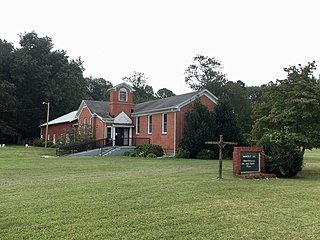
The Union Wesley Methodist Episcopal Church Complex is a historic church and summer camp meeting facility on Powell Farm Road near Clarksville, Delaware. The property was developed in the post-Civil War era as a summer religious camp for African Americans. It was established around 1873, with an open tabernacle structure for religious functions, surrounded by modest cottages. An 1890 one-room schoolhouse that was used in the education of African-American children was adapted as the camp's refectory in 1922, and in 1959 the Union Wesley Methodist Episcopal Church was built on the property. The school building in particular is notable as one of the best-preserved late 19th-century schools for African-Americans in the state.
Oakley Chapel African Methodist Episcopal Church is a historic African Methodist Episcopal church located at Tebbetts, Callaway County, Missouri. It was built in 1878, and is a one-story, frame gable front church on a concrete foundation. Also on the property are the contributing small cistern and cemetery. There are approximately 80 known burials in the cemetery.
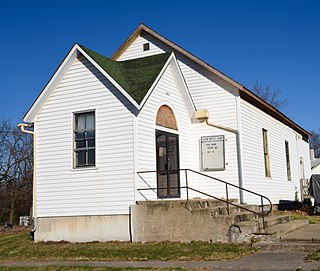
The former Second Baptist Church is a historic building located in Mount Pleasant, Iowa, United States. The First Colored Baptist Church of Mt. Pleasant, later Second Baptist Church, was founded in the summer of 1863 by members of First Baptist Church for the education and worship of the community's African American population. The congregation is also referred to as the "African Baptist Church". It is possible that this building was the original Methodist Episcopal church building constructed in 1843. It is believed that it was moved here in 1856 or 1857 for a newly established congregation of the Methodist Protestant Church. Either that or the main part of this small frame church was built here at that time. Regardless, the Methodist Protestant congregation did not succeed and the property was sold to First Baptist Church in January 1864 for use by the "Colored Baptist Church."

Quinn Chapel African Methodist Episcopal (AME) Church was the first Black church to be founded in Lincoln, Nebraska.

The Methodist Episcopal Church, also known as the Methodist Episcopal Church of Hibernia, is a historic church built in 1869 and located at 419 Green Pond Road in the Hibernia section of Rockaway Township, Morris County, New Jersey. It was added to the National Register of Historic Places on July 14, 2011, for its significance in architecture and industry. Since 1970, the building has been used as a branch of the Rockaway Township Free Public Library.



















